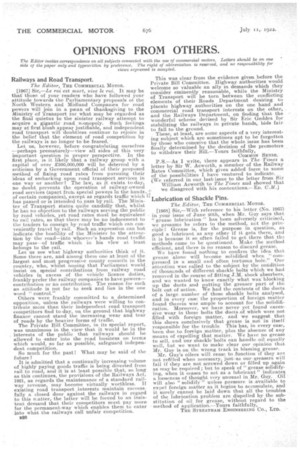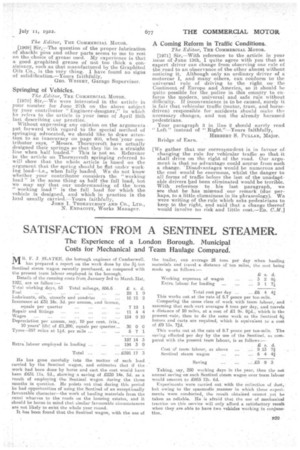OPINIONS FROM OTHERS.
Page 26

Page 27

If you've noticed an error in this article please click here to report it so we can fix it.
The Eiitor invites correspondence on all subjects connected with the use of commercial motors. Letters should be on one side of the paper only and typewritten by preference. fl'he right of abbreviation is reserved, and no responsibility for
views expressed is accepted.
Railways and Road Transport.
The Editor, THE COMMERCIAL MOTOR.
[1967] Sir,—Le roi est mort, Dive le roi. It may be that those of your readers who have followed your attitude towards the Parliamentary proposals ot the North Western and Midland Companies for road powers will join in a peen of thanksgiving to the Ministry of Transport tor what may be regarded as the final quietus to the sinister railway attempt to acquire a gigantic road monopoly. Such feelings may at first blush appear justifiable, and independent road transport will donbtless continue to rejoice in the belief that the element of road competition by the railways is no longer to be feared. Let us, however, before congratulating ourselves —perhaps prematurely—view all sides of this very• important question in proper perspective. In the first place is it likely that a railway group with a capital of, over £500,000,000 will be deterred by a criticism by a Government official of their proposed method of fixing road rates from pursuing their ideas of embarking -upon road transport services in one way or another? The law, as it exists to-day, no doubt prevents the operation of railway-owned road services (apart from special powers in the hands, 4'
of certain companies), except as regards traffic which has passed or is intended to pass by rail. The Minister of Transport States quite candidly that, whilst he has no objection to the railways serving the public by road vehicles, yet road rates thug, be equivalent to rail rates, so that there may be no inducement to the traders to consign by road traffic which can conveniently travel by rail. Such an expression can but indicate the hostility of the Minister to the attraction by the road—into whoever's hands road traffic may pass—of traffic which in his view at least belongs to the rail.
Let us see what highway authorities think of it. Some there are, and among them one at least of the . largest and most progressive county councils in the country, who, whilst hoping that Parliament would, insist on special contributions from railway road vehicles in excess of the vehicle licence duties, • frankly prefer the railway companies to have powers— contribution or no contribution. The reason for such an attitude is not far to seek and lies in the one word " control."
Others were frankly committed to a determined opposition, unless the railways were willing to contribute more than their independent road transport competitors find to-day, on the ground that highway finance cannot stand the increasing wear and tear of roads by the heavier forms of traffic. The Private Bill Committee, in its special report, was unanimous in the view that it would be in the , interests of the public that railways should be allowed to enter into the road business on terms which would, so far as possible, safeguard independent competition.
So much for the past! What may be said of the future?
It is admitted that a continually increasing volume of highly paying goods traffic is being diverted from rail to road, and it is at least possible that, so long as this continues' the provisions of the Railways Act, 1921, as regards the maintenance of a standard railway revenue, may become virtually worthless. If existing road transport interests maintain successfully a closed door against the railways in regard to this matter, the latter will be forced to an insistent demand that their competitors must pay more for the permanent-way which enables them to enter into what the railways Call unfair competition.
B28 This was clear from the evidence given before the Private Bill Committee. Highway authorities would welcome so valuable an ally in demands which they consider eminently reasonable, while the Ministry of Transport will be torn between the conflicting elements of their Roads Department desiring to placate highway authorities on the one hand and commercial road transport interests on the other, and the Railways Department, on finding that the wonderful scheme devised by Sir Eric Geddes for stabilizing the railways in private hands, bids fair. to fall to the ground. These, at least, are sonic aspects of a very interesting subject which are sometimes apt to be forgotten by those who conceive that the whole issue has been finally determined by the decision of the promoters to withdraw their Bill.—Yours faithfully,
COMMON SENSE. P.S.—As I write, there appears in The Times a letter by Sir W. Acworth, a member of the Railway Rates Committee, which gives added force to some of the possibilities I have ventured to indicate. [We referred in our last issue to the letter from Sir William Acworth to The Times and showed that we disagreed with his contentions.—En, C.M.]
Lubrication of Shackle Pins.
The Editor, THE COMMERCIALMOTOR.
[1968) Sir,—With reference to his letter (No. 1963) • in your issue of June 20th, when Mr. guy says that "grease lubrication " has been adversely criticised, we presume he refers to the method, not the principle? Grease is, for the purpose in question, as good a lubricant as any other if it gets there, and it is because it so often failed to get there that the methods came to be questioned. bloke the method efficient, and there is no reason to discard grease. We have found nothing to confirm the idea that
grease alone will become solidified when "cornpressed in a small and often tortuous hole." Our attention was called to the subject by the condition of thousands of different shackle bolts which we had removed in the course of fitting J.M. shock absorbers, and we wanted to know exactly what was :blocking up the ducts and putting the greaser part of the bolt out of action. We had the contents of the ducts of a large number of those shackle bolts analysed, and in every ease the proportion of foreign matter found therein was ample to account for the solidification. Moreover, we have never yet found excessive wear in those bolts the ducts.of which were not .filled with foreign matter, and we suggest that this shows conclusively that grease is not in itself responsible for the trouble. This has, in every case, been due .t foreign matter, plus the absence of any means of expelling that matter. We have no grease to sell, and our shackle-bolts can handle.oil equally well, but we want to make clear our opinion that Mr. Guy is on the wrong track in blaming grease. Mr. Guy's oilers will cease to ,function if they are not refilled when necessary, just'as our greasers will fail if they are not screwed down or filled up again as may be required ; but to speak of " grease solidifying, when it ceases to act as a lubricant" indicates a looseness of thought very unusual in Mr. Guy. Oif • will also " solidify" unless pressure is .available to expel foreign matter as it begins to accumulate, and it surely cannot be laid down that all the troubles of the lubrication problem are dispelled by the substitution of oil for grease, without regard to the
• method of application.—Yours faithfully, THE STREATHAM .ENGINEERING CO., LTD.
The Editor, THE COMMERCIAL MOTOR.
[1969] Sir,—The question of the proper lubrication of shackle pins and other parts seems to me to rest on the choice of grease used. My experience is that a good graphited grease of not too thick a consistency, such as that manufactured by the Graphited Oils Co., is the very thing. I have found no signs of solidification.Yours faithfully, GEO. WRIGHT, Garage Supervisor.
Springing of Vehicles.
The Editor, THE COMMERCIAL MOTOR.
[1970] Sir,—We Were interested in the article in your number for June 27th on the above subject by your contributor " Engineer-designer," in which he refers to the article in your issue of April 25th last describing eur practice.
Without expressing any opinion on the arguments put forward with regard to the special method of springing advocated, we should like to draw attention to an inaccuracy on page 600, when your contributor says, " Messrs. Thornycroft have actually designed their springs so that they lie in a straight line when half loaded." This is not so. Reference to the article on Thornycroft springing referred to will show that the whole article is based on the argument that the spring should be flat under workina load—i.e., when fully loaded. We do not know walher your contributor considers the "working load " is the same thing as half the full load, but we may say' that our understanding of the term "working load" is the full load for which the vehicle is designed, and which in practice is the load usually carried.--Yours faithfully, JOHN I. THORNYCROET AND CO., LTD., N. ENDACOTT, Works Manager. A Coming Reform in Traffic Conditions, The Editor, THE COMMICROIAL MOTOR.
[1971] Sir,—With reference to the article in your issue of June 13th, I quite agree with you that an expert driver can change from observing one rule of the road to an observance of the other almost without noticing it. Although only an ordinary driver of a motorcar I, and many others, can conform to the universal rule of 'driving to the right onthe Continent of Europe and America, so it should be quite possible for the police in this country to enforce the modern, universal and safe rule without difficulty. If inconvenience is to be caused, surely it is fair that vehicular traffic (motor, tram., and horse'driven) responsible for accidents should make the necessary changes, and not the already harassed pedestrians.
Your (paragraph 3 in line 2 should surely read " Left" instead of " Right."—Yours faithfully, HERBERT S. PUT.LAR, Major.
Bridge of Earn.
We gather that our correspondent is in favour ofchanging the rule for vehicular traffic so that it shall drive on the right of the road. Our argument is that no advantage could accrue from such a change. 'Disadvantages would be numerous and the cost would he enormous, whilst the danger to all .forms of traffic before the last of the unadaptable drivers had been eliminated would be terrible. With reference to his last paragraph, we see that he has misread our remark (due perhaps, to a little clumsiness in its phraseology). We were writing of the rule which asks pedestrians to keep to the right, and said that a change thereof would involve no risk and little cost.--En. Cif.]






























